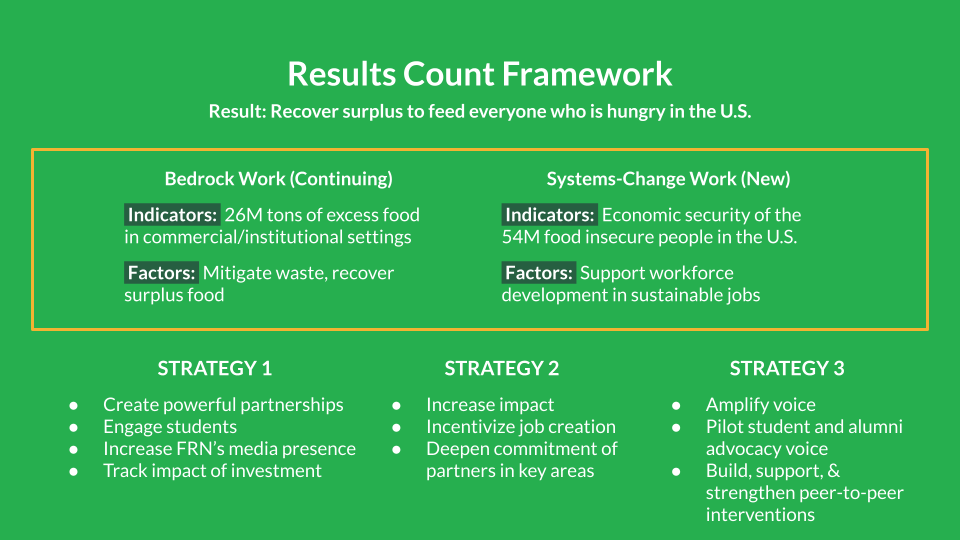As a continued commitment to Food Recovery Network’s public learning approach and stakeholder engagement feedback loop, based on our latest conversation about our strategic framework, FRN10X, I wanted to provide our latest key takeaways. The takeaways are based on our latest sections of our FRN10X work from October 2020 to February 2021. We asked those in attendance to answer the question (and answer as many times as they wanted, even after the presentation on social media!) What does a just and equitable food system look like to you? I again invite those of you reading this post to continue to answer this question and tell us on any social media platform with which you interact with FRN. In the meantime, please read our latest takeaways from all of you.
There is food to recover. Twenty-five percent of our chapters are currently recovering surplus food. That 25% of recovering chapters were able to recover the same amount of surplus food as 25% of our movement recovered before the pandemic. The amount of food did not decrease and reminds us all, there continues to be surplus food, though it may be located at different places within the food system.
Disproportionate adoption across programs. At FRN, we offer several programs and ways to engage our network. There was a lot of excitement and approval of those offerings from our stakeholders. However, adoption across those offerings has varied. Luckily there has been high adoption on certain aspects of the work that will allow us to dig in at the appropriate level of engagement and also offerings that did not receive as much engagement as we had anticipated based on the encouraging feedback from stakeholders. We will also evaluate the offerings that did not receive much engagement to stop those offerings, or alter them into different programs. This is critical learning to ensure FRN can meet the needs and interest of our students and alums with an adaptable approach.
We will keep you updated! During our latest presentation on FRN10X, we asked all attendees how they most wanted to interact with FRN: To be informed, to act as consultants and/or to act as partners, the majority of people said they wanted to be informed.
We continue to be adaptive. FRN is moving into areas of work within the food system and programming that we’ve not before. Entering into these new spaces means we have to be very clear that the work in which we are engaged are pilots. We have hypotheses on the work, but we really need to engage in the work, see what happens, and analyze why programs shape up the way they do, and from there we will need to analyze critically as we move forward.
When we asked our stakeholders What does a just and equitable food system look like to you, some of the recurring themes we heard were access to culturally appropriate foods and access to enough calories were part of the vision for that food system.
People are responding very positively to our commitment to public learning!
Thank you all for your interaction with our strategic framework, FRN10X. Please continue to share your thoughts with us. Be on the lookout for our next Roundtable Talk summer 2021.













